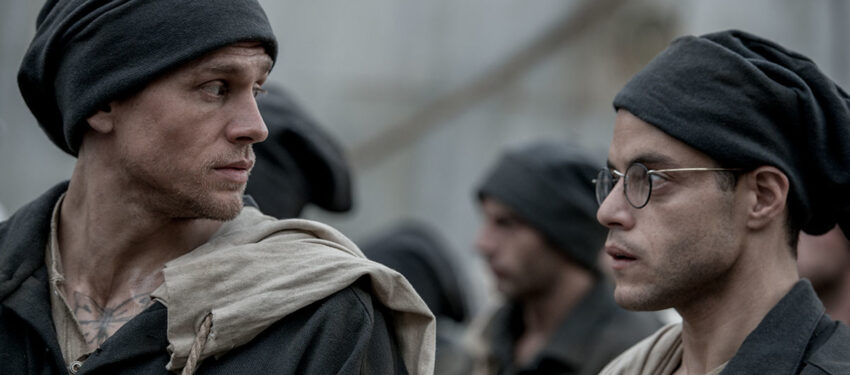Charlie Hunnam kicks off day one of TIFF with “Papillon”, telling ET Canada he loves spending time in Toronto with the city’s cinemagoers who he hopes will see his latest film as more than just a remake of the original 1973 movie with Dustin Hoffman and Steve McQueen.
Category: Press
Remaking a classic like “Papillon” certainly doesn’t sound like the wisest idea on paper. The iconic 1973 film starring Steve McQueen and Dustin Hoffman is all-timer, which makes you wonder at the hubris of trying to create lightning in a bottle twice. But we’ll find out at the Toronto International Film Festival is this redo is folly or not.
Charlie Hunnam and “Mr. Robot” star Rami Malek take the lead roles in this version, which has a script from “Prisoners” writer Aaron Guzikowski, and Danish director Michael Noer (“R“) behind the camera. Apparently, this will be a contemporary take on the based-on-a-true-story thriller about a man unjustly convicted of murder who enlists the help of a counterfeiter to break him out of a South American jail. Hunnam will be taking the McQueen role, with Malek in Hoffman’s shoes.
TIFF runs from September 7-17.
Source: theplaylist.com
EXCLUSIVE: The JC Chandor-directed thriller Triple Frontier has regained its footing at Netflix for a potential August production start. Mark Wahlberg is now in talks to replace Ben Affleck, who dropped out last week. The film will shoot in Hawaii and Colombia and will star Sons of Anarchy‘s Charlie Hunnam, Mudbound‘s Garrett Hedlund and Pedro Pascal, coming off Game of Thrones and Narcos. Wahlberg is coming off Transformers: The Last Knight. Still in the mix is Adria Arjona, who has been attached right along.
This last–minute activity is just part and parcel of the resilience this film has shown. Triple Frontier was a go at Paramount but hit the rocks when lead actors Tom Hardy and Channing Tatum dropped out over creative differences, weeks before the start of production. That, a $70 million price tag and the fact the studio was going through a regime change with the exit of the late Brad Grey (who championed the project), prompted Paramount to put the film into turnaround. Deadline revealed this implosion on April 12, and then on May 1 revealed that Netflix was pursuing the picture along with other suitors, with Affleck and his Oscar-winning brother Casey courted. The elder Affleck was ready to go but decided to take a break to focus on his health and family. Incoming Netflix feature film head Atlas producers Charles Roven and Alex Gartner kept the fires stoked, and now they have pulled off a rarity: saving a project that seemed in grave danger of flatlining.
Scott Stuber has been tasked with assembling a star-driven slate that could reach 40-50 annual films in total, and Triple Frontier gets added to a growing film roster that recently included the deal that reteams Nightcrawler writer-director Dan Gilroy with Jake Gyllenhaal and Rene Russo for an untitled film set in the art world, and Highwaymen, the John Lee Hancock-directed film put in turnaround at Universal about the Texas Rangers who hunted down and killed bank robbers Bonnie and Clyde, with Kevin Costner and Woody Harrelson starring.
Originally written by Mark Boal with a rewrite by Chandor, Triple Frontier is a thriller set in the notorious border zone between Paraguay, Argentina and Brazil where the Iguazu and Parana rivers converge. This is a film that Katherine Bigelow once planned to direct, and which at one time Tom Hanks and Will Smith and Johnny Depp circled, so it has always had its fans.
Source: deadline.com
Guy Ritchie’s King Arthur: Legend of the Sword is coming to Digital OnDemand July 25th and Blu-ray, Blu-ray 3D & 4K Ultra HD Blu-ray August 8th! Be sure to pre-order your copy now.
Charlie and director Guy Ritchie stopped by The Graham Norton Show on May 12th to promote their film King Arthur: Legend of the Sword and more. You can check out the video below in case you missed it.
Screen captures to be posted soon!




Public Appearances > 2017 > 05/12/17 – Visiting The Graham Norton Show
Screen Captures > 05/12/17 – The Graham Norton Show **Soon**



